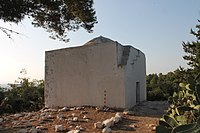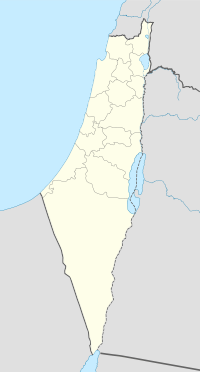Ayn Ghazal
Tampilan
Ayn Ghazal
عين غزال 'Ain Ghazal, 'Ein Ghazal | |
|---|---|
Desa | |
 Makam Sheikh Shahada | |
| Koordinat: 32°37′55″N 34°58′03″E / 32.63194°N 34.96750°E | |
| Grid Palestina | 147/226 |
| Entitas geopolitik | Mandat Palestina |
| Subdistrik | Haifa |
| Tanggal pengosongan | 24–26 Juli 1948[3] |
| Luas | |
| • Total | 14,628 dunams (14,628 km2 or 5,648 sq mi) |
| Populasi (1945) | |
| • Total | 2.170[1][2] |
| Sebab pengosongan | Serangan militer oleh pasukan Yishuv |
| Wilayah saat ini | Ein Ayala?[4]Ofer |
Ayn Ghazal (bahasa Arab: عين غزال) adalah sebuah desa Arab Palestina yang berjarak 21 kilometer (13 mi) dari selatan Haifa. Dikosongkan pada Perang Arab-Israel 1948 akibat serangan militer Israel pada Operasi Shoter, desa tersebut kemudian sepenuhnya dihancurkan.
Referensi
[sunting | sunting sumber]Daftar pustaka
[sunting | sunting sumber]- Barron, J.B., ed. (1923). Palestine: Report and General Abstracts of the Census of 1922. Government of Palestine.
- Benvenisti, E.; Gans, Chaim; Ḥanafī, Sārī (2007). Eyal Benvenisti; Chaim Gans; Sārī Ḥanafī, ed. Israel and the Palestinian refugees (edisi ke-Illustrated). Springer. ISBN 978-3-540-68160-1.
- Benveniśtî, M. (2000). Sacred landscape: the buried history of the Holy Land since 1948 (edisi ke-Illustrated). University of California Press. ISBN 0-520-21154-5.
- Conder, C.R.; Kitchener, H.H. (1882). The Survey of Western Palestine: Memoirs of the Topography, Orography, Hydrography, and Archaeology. 2. London: Committee of the Palestine Exploration Fund.
- Government of Palestine, Department of Statistics (1945). Village Statistics, April, 1945.
- Guérin, V. (1875). Description Géographique Historique et Archéologique de la Palestine (dalam bahasa French). 2: Samarie, pt. 2. Paris: L'Imprimerie Nationale.
- Hadawi, S. (1970). Village Statistics of 1945: A Classification of Land and Area ownership in Palestine. Palestine Liberation Organization Research Center.
- Khalidi, W. (1992). All That Remains: The Palestinian Villages Occupied and Depopulated by Israel in 1948. Washington D.C.: Institute for Palestine Studies. ISBN 0-88728-224-5.
- Karmon, Y. (1960). "An Analysis of Jacotin's Map of Palestine" (PDF). Israel Exploration Journal. 10 (3,4): 155–173; 244–253. Diarsipkan dari versi asli (PDF) tanggal 2019-12-22. Diakses tanggal 2020-07-20.
- Masalha, N., ed. (2005). Catastrophe Remembered: Palestine, Israel and the Internal Refugees. Palgrave Macmillan. ISBN 1-84277-622-3.
- Mills, E., ed. (1932). Census of Palestine 1931. Population of Villages, Towns and Administrative Areas. Jerusalem: Government of Palestine.
- Morris, B. (2004). The Birth of the Palestinian Refugee Problem Revisited. Cambridge University Press. ISBN 978-0-521-00967-6.
- Mülinen, Egbert Friedrich von 1908, Beiträge zur Kenntnis des Karmels "Separateabdruck aus der Zeitschrift des Deutschen Palëstina-Vereins Band XXX (1907) Seite 117-207 und Band XXXI (1908) Seite 1-258."
- Palmer, E.H. (1881). The Survey of Western Palestine: Arabic and English Name Lists Collected During the Survey by Lieutenants Conder and Kitchener, R. E. Transliterated and Explained by E.H. Palmer. Committee of the Palestine Exploration Fund.
- Schumacher, G. (1888). "Population list of the Liwa of Akka". Quarterly statement - Palestine Exploration Fund. 20: 169–191.
- Slyomovics, Susan (1998). The object of memory: Arab and Jew narrate the Palestinian village (edisi ke-Illustrated). University of Pennsylvania Press. ISBN 978-0-8122-1525-0.
- Yazbak, M. (1998). Haifa in the late Ottoman period, 1864-1914: a Muslim town in transition (edisi ke-Illustrated). BRILL. ISBN 978-90-04-11051-9.
Pranala luar
[sunting | sunting sumber]- Welcome To 'Ayn Ghazal
- 'Ayn Ghazal, Zochrot
- Survey of Western Palestine, Map 8: IAA, Wikimedia commons
- Ayn Ghazal from the Khalil Sakakini Cultural Center
- 3ein Ghazal Diarsipkan 2020-07-20 di Wayback Machine., from Dr. Moslih Kanaaneh
- Ali Hamoudi, Ayn Ghazzal, testimony, 1 March 2003, from Zochrot
- Tour and signposting at Ayn Ghazzal, 6.6.03, Zochrot
- Remembering Ayn Ghazal, Booklet from Zochrot, 07/2003
- "Memoirs" "Refugee Interviews" in Journal of Palestine Studies:

